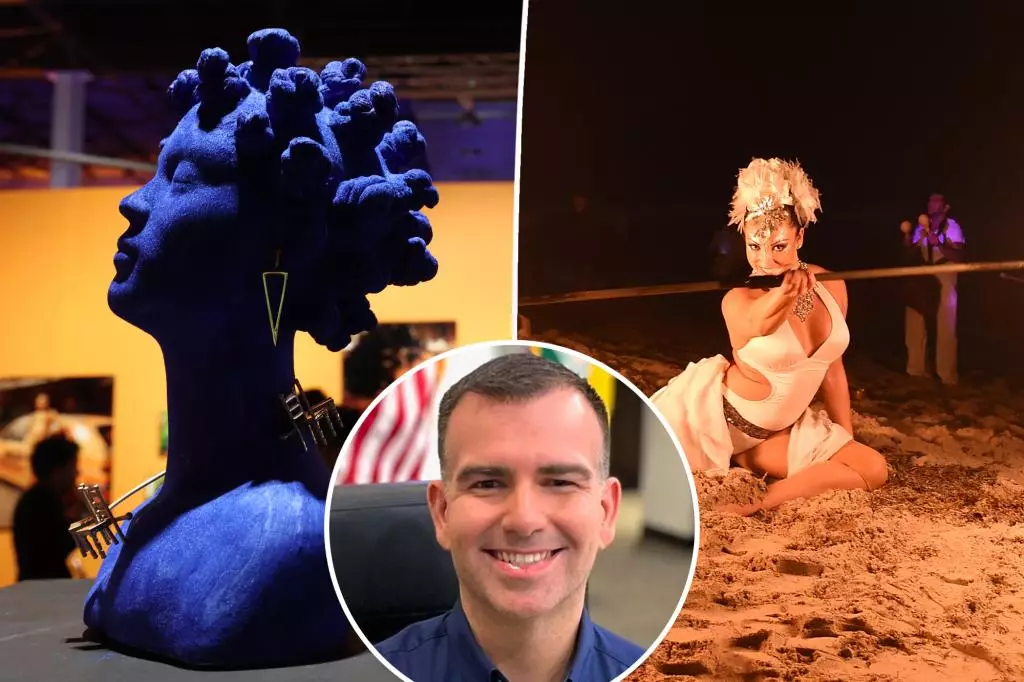The vibrant nightlife of Miami Beach, particularly during the renowned Art Basel week, is under fire as local high society confronts the city’s new regulations aimed at controlling extravagant parties. This clash between millionaire homeowners and municipal authorities not only highlights the struggle over party culture but also raises significant questions about the balance between individual rights and community welfare. The stakes are high, with affluent residents poised to defend their ostentatious celebrations against the backdrop of a society that thrives on cultural expression through art and socializing.
Three prominent figures from the elite Palm, Star, and Hibiscus Islands have initiated legal action to preserve their opulent gatherings. Leonard Hochstein, a known plastic surgeon and TV personality, alongside Farmasi CEO Sinan Tuna and Hibiscus Island resident Daniel Liburdi, have joined forces to contest a recent city resolution that demands permits for large-scale events. This shift, implemented by the Miami Beach government, arises from a surge of complaints from residents about the impacts of such highly commercialized parties, including noise disturbances and traffic disruptions that hinder emergency response times.
The trio claims they have collectively invested approximately $4 million into their annual parties, asserting that the new regulation puts their elaborate events—some of which include performers like Ludacris—at risk of being cancelled or heavily policed. Their legal representation, Richard Wolfe, argues that the policy was enacted without following proper legal procedures and infringes on their right to host such gatherings. This plea encapsulates a broader discussion about the justified need for permits versus the rights of individuals to assemble freely.
The opinions within Miami Beach are starkly divided. While the party promoters view the regulations as an unwarranted encroachment on their lifestyle, residents who face the consequences of these events advocate for stricter controls. Vice Mayor Alex Fernandez, who supports the resolution, argues that the changes were necessary to protect neighborhood tranquility and public safety. He emphasizes that the presenters of these “commercial-grade” events are largely responsible for the discomfort and chaos that typically surrounds Art Week.
Local residents have expressed frustrations over the noise and the influx of crowds that create significant disturbances. There are reports of emergency vehicles struggling to navigate clogged roads, further intensifying the debate about whether the lavish parties are worth the risk to safety. Many residents feel that these gatherings do not just disrupt peace; they also undermine the very essence of Art Basel by overshadowing the established cultural festivities with unregulated celebrations.
Luxury party organizers have long hinged their reputations and fortunes on the opulence associated with events like Art Basel. To illustrate, Hochstein alone has spent upwards of $300,000 on his past parties, a testament to the resources poured into making a statement during Miami’s biggest art week. However, the allure of hosting such grandiose celebrations may come at a cost.
The debate transcends just monetary investments; it encapsulates the very identity of Miami Beach. As the city seeks to regulate and control, the question looms: can art and festivities coexist with sensible regulations? By prioritizing safety and order, the administration argues that it is preserving the integrity of the cultural experience that Art Basel amplifies. Conversely, party influencers argue that the new restrictions stifle creativity and the very spirit of celebration intrinsic to this artistic gathering.
As the hearing on the legal challenge approaches, it remains to be seen whether a compromise can emerge from this standoff. The Vice Mayor recognizes the significance of celebrations during Art Week but insists they must be managed in a manner conducive to the community’s wellbeing. He proposes that events should be contained and organized in such a way that they enrich the public experience rather than detract from it.
Ultimately, Miami Beach is at a crossroads, navigating the delicate balance between fostering an environment conducive to cultural festivities while addressing the valid concerns of its residents. As both sides of this debate prepare for a resolution, there is hope that the city can cultivate an inclusive atmosphere that respects artistic expression and preserves the quality of life in its neighborhoods. With the hearing looming, all eyes will be on the decisions made, pondering the future of partying against a backdrop of regulation in an ever-evolving cultural landscape.

